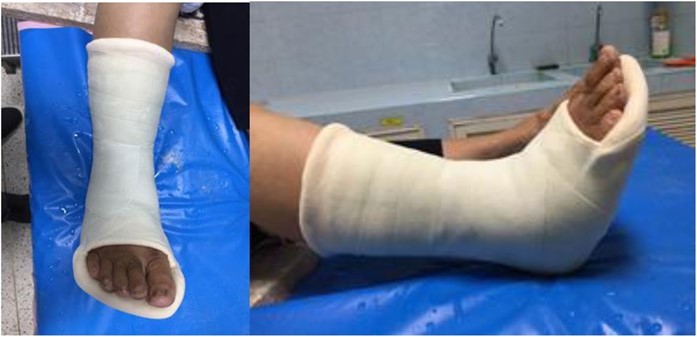A client with a compound fracture of the left ankle is being discharged with a below-the-knee cast. Which
instruction should the practical nurse (PN) provide to the client prior to discharge?
Apply a cold pack to any "hot spots" on the cast.
Keep the left leg in a dependent position.
Expect some increase in pain.
Never scratch under the cast.
The Correct Answer is D
When providing instructions to a client with a below-the-knee cast for a compound fracture of the left ankle, it is important to prioritize their safety and proper care of the cast. The instruction to never scratch under the cast is crucial for preventing complications and maintaining the integrity of the cast.
Let's evaluate the other options:
a) Apply a cold pack to any "hot spots" on the cast.
Applying a cold pack to any "hot spots" on the cast may help alleviate discomfort or itching, but it is not the highest priority instruction. Preventing scratching under the cast is more important to avoid skin damage or infection.
b) Keep the left leg in a dependent position.
Keeping the left leg in a dependent position (hanging down) is not the appropriate instruction for a client with a below-the-knee cast. It is generally recommended to elevate the injured limb to reduce swelling and promote proper blood flow. Elevating the leg would involve keeping it raised above the level of the heart.
c) Expect some increase in pain.
While it is possible for the client to experience some increase in pain after the application of a cast, this instruction alone is not comprehensive or specific enough for proper discharge education. Providing information about pain management strategies or when to seek medical atention for excessive pain would be more appropriate.
In summary, when discharging a client with a compound fracture of the left ankle and a below-the-knee cast, the practical nurse (PN) should provide the instruction to never scratch under the cast. This helps prevent complications and maintain the integrity of the cast, promoting proper healing of the fracture.

Nursing Test Bank
Naxlex Comprehensive Predictor Exams
Related Questions
Correct Answer is ["B","C","D","E"]
Explanation
Choice A reason: Epidemiology interprets legislation in the community is not a statement that indicates the importance of epidemiology to the community health nursE. Epidemiology does not deal with legal issues, but rather with scientific methods and evidencE.
Choice B reason: Epidemiology relates to the health status of a population is a statement that indicates the importance of epidemiology to the community health nursE. Epidemiology measures and monitors the frequency, distribution, and trends of diseases and health indicators in a population.
Choice C reason: Epidemiology analyzes and examines the root causes of health outcomes is a statement that indicates the importance of epidemiology to the community health nursE. Epidemiology identifies and investigates the factors and interactions that influence the occurrence and prevention of diseases and health conditions.
Choice D reason: Epidemiology evaluates the effectiveness of nursing interventions is a statement that indicates the importance of epidemiology to the community health nursE. Epidemiology designs and conducts studies to assess the impact and outcomes of nursing programs, policies, and practices on population healtH.
Choice E reason: Epidemiology defines the burden of disease and determinants of health is a statement that indicates the importance of epidemiology to the community health nursE. Epidemiology estimates and compares the magnitude and severity of diseases and health problems, as well as their causes and risk factors, in different populations and settings.
Correct Answer is D
Explanation
Choice A reason: Proactive prevention is not a level of prevention, but a type of prevention that involves anticipating and avoiding potential health problems before they occur.
Choice B reason: Secondary prevention is a level of prevention that involves screening, early detection, and prompt treatment of health problems to prevent complications and limit disability.
Choice C reason: Tertiary prevention is a level of prevention that involves rehabilitation, restoration, and support of health and function after a health problem has caused damage or disability.
Choice D reason: Primary prevention is a level of prevention that involves health promotion and protection of health and well-being by reducing or eliminating risk factors and preventing the onset of disease or injury.
Whether you are a student looking to ace your exams or a practicing nurse seeking to enhance your expertise , our nursing education contents will empower you with the confidence and competence to make a difference in the lives of patients and become a respected leader in the healthcare field.
Visit Naxlex, invest in your future and unlock endless possibilities with our unparalleled nursing education contents today
Report Wrong Answer on the Current Question
Do you disagree with the answer? If yes, what is your expected answer? Explain.
Kindly be descriptive with the issue you are facing.
